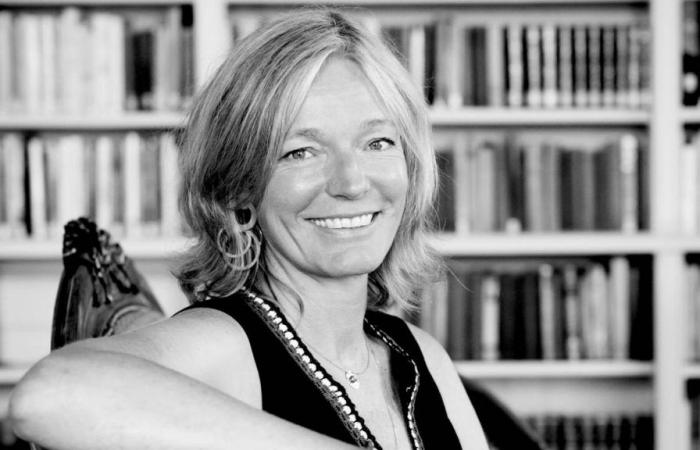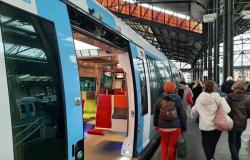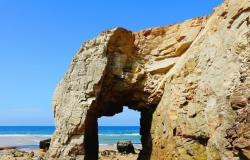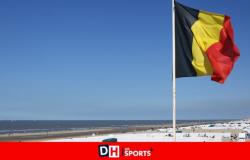The peacock that cartwheels
As a gesture of reverence, she concocted a “fireworks” program, as she says, almost doubling the number of meetings, which sometimes increased to four per week. “Like the peacock cartwheels by presenting its best attire,” she smiles, she brought together, as much as possible, the authors who matter to her, and with whom she was able to build bonds of trust. “I realize that what connects these personalities is their profound freedom, that of not being afraid of being oneself, that of taking side roads, that of being able to combine depth and lightness.”
Thus from the Egyptian writer Alaa El Aswany: “It was very important for me that he opened the lights of this season, on September 17. In the evening of Alexandriahis new novel, is very close to The Yacoubian Building. When reading, we understand, from the inside, how a country falls into dictatorship. Only fiction allows this kind of intimate experience.” Thus, two days later, from Sophie Calle, the visual artist who makes writing an essential medium: “Who is more free than Sophie Calle in the way she combines her personal life and her work as an artist? I am still moved by what she shared with the public.
To spark or not
It’s impossible to mention everyone in this season which tells a lot about the one who put it together. But let us also point out, on October 29, an improbable meeting between Giuliano da Empoli, the author of Do you like the Kremlin, and Edouard Philippe, former French prime minister and 2027 presidential candidate: “I like to create amazing duets. In this case, it was the similarities in their backgrounds, between political commitment and writing, which tickled my curiosity,” she explains. Sometimes these pairs spark, sometimes it’s the opposite, like between Luc Ferry and Bernard Werber, “who didn’t find each other at all.” In 2009, Jacques Chessex was to speak with Amélie Nothomb, “both were delighted” but the author of L’Ogre died suddenly shortly before.
We should also mention, in this final season, an exhibition of drawings by Patrick Chappatte (just before the American elections), Stephan Eicher, Catherine Lovey but also Cédric Sapin-Defour, the author of the surprise bestseller (400,000 copies) , Its smell after the rain (“a favorite of rare sensitivity on the relationship between human and animal”), the philosopher Charles Pépin (“a master of joyful transmission”), Christophe André, Vincent Kucholl and Vincent Veillon, Coline Serreau and, in by way of conclusion, the journalist François Busnel (“because he embodied curiosity and the pleasure of reading and we have walked in parallel for all these years”).
The metamorphosis of the landscape
Delphine de Candolle serves us a second cup of sencha. Twenty-five years then. Or around 1,300 meetings, nearly ten reading circles, a Youth Literature Festival, an English-speaking Literature Week, the first edition of which has just taken place. All in a French-speaking Swiss literary landscape which has transformed in a quarter of a century, with the entry on the scene of the Maison Rousseau et Littérature, the Jan Michalski Foundation, the Livre sur les quais, the Festival du LÀC, ” and bookstores which have also become meeting spaces with writers. I believe in the complementarity between all these places. With strong, distinct identities, we do not reach the same audience, apart from enthusiasts who circulate from one to the other,” believes the manager.
So why leave? “It’s a question of energy,” she responds promptly. “If I had to start again, I would sign with both hands but it must be said, it is a high-intensity job…” For around ten years, a theme has taken more and more place in Delphine’s life de Candolle (and in the programming of the Reading Society), that of climate protection and animal welfare.
Planting seeds
By reading essays, newspaper articles but even more by following activists and associations on Instagram (“who source and cross-check their information”), she discovered and invited Blaise Hofmann, Pablo Servigne, Cyril Dion and even Camille Etienne. Then, the need to move from words to action became evident. “I intend to give myself a year to meet people who inspire me on these issues and to see to what extent I could be useful in supporting projects and fundraising for example. If I can even plant a few seeds to move things forward, that makes sense to me.”
She matured and carefully prepared this departure with Emmanuel Tagnard, a long-time journalist at RTS, who became responsible for communications and English-speaking programming at SDL. For two years, they have also shared responsibility for the season, “Emmanuel takes care of spring and I take care of autumn.” From January 2025, when Delphine de Candolle leaves, he will design the entire program. A smooth handover therefore.
The teapot is empty. Delphine de Candolle still wants to share one pride: the strength of the team spirit that unites the nine people involved in making the SDL work, from the administrative director Lillian Chavan to the librarians, as well as the volunteer members of the Committee and of the Reading Commission. We also talked about deforestation, Bolivia in flames and the undignified conditions imposed on animals in slaughterhouses. A blink of an eyelash and an hour had passed.






